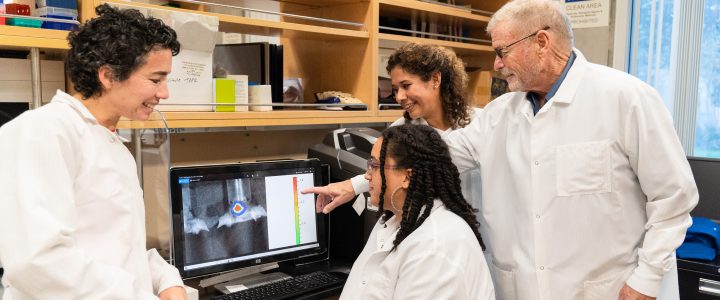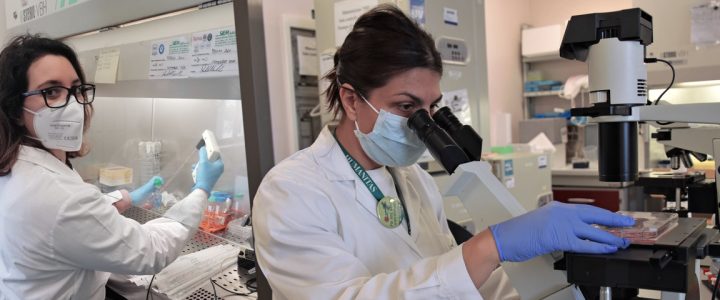The march of time renews the commitment we made to a special needs community 25 years ago. We vowed to dream big and never give up until there were effective treatments available and eventually a cure for Fragile X syndrome, the most commonly inherited cause of intellectual disabilities and autism.
Read moremRNAs
C-subunit Mitochondrial Leak Channel in Fragile X Syndrome

Explore Yale’s groundbreaking study on mitochondrial leak channels, set to revolutionize Fragile X syndrome treatment. Funded by a $100,000 FRAXA grant.
Read moreAntisense Oligonucleotides (ASOs) to restore FMRP in Human Fragile X Cerebral Organoids

Explore Dr. Richter’s encouraging results with ASOs for Fragile X syndrome. A $100,000 grant now fuels pivotal studies needed to advance toward ASO therapy.
Read moreASOs and Fragile X: Addressing the Most Asked Questions

Explore the potential of ASOs in treating Fragile X syndrome & FXTAS. Dive into a comprehensive Q&A addressing key questions and breakthrough findings.
Read moreSlack Potassium Channel Inhibitors to Normalize FMR1 Knockout Mice

Learn how a $100,000 FRAXA research grant supports Yale researchers in using Slack potassium channel inhibitors to treat Fragile X syndrome by normalizing behaviors in FMR1 knockout mice.
Read moreBreakthrough Discoveries in Fragile X Research: Insights from Special Banbury Meeting on Curative Therapies

Explore the latest breakthroughs in Fragile X research unveiled at the recent Banbury Meeting. Discover novel strategies, from gene therapy to protein replacement, that bring hope for curative therapies.
Read moreFRAXA Investigator Lynne Maquat Awarded 2023 Gruber Genetics Prize

Dr. Maquat, 2023 Gruber Genetics Prize winner, discovered NMD, a key surveillance system in the body that protects against mistakes in gene expression. Her groundbreaking research has led to new therapies for Fragile X syndrome.
Read moreTargeting Cognitive Function in Fragile X Syndrome

It has long been assumed that the differences between males and females with Fragile X were simply a matter of degree, with males being more severely affected. But gender differences may be far reaching. This team is working to understand imbalances in how the brain’s neurons transmit signals, with a focus on how differently males and females learn and experience anxiety. They are studying two neuronal pathways which are promising targets for treatment.
Read moreHuman FMR1 Isoform-Specific Regulation of Translation and Behavior

Fragile X syndrome is caused by lack of one protein, FMRP. But this one protein occurs in different variations. Do the different versions of FMRP have different roles in the brain, and if so, is there one that’s key? If we could replace FMRP to treat Fragile X syndrome, which version would we use?
Read moreCharacterization and Modulation of microRNAs in Fragile X Syndrome

Could microRNAs be a new path to treatment of Fragile X syndrome? MicroRNAs are disrupted in Fragile X, and so this team will work to understand what is going wrong and explore ways to correct it with drugs which directly target microRNAs.
Read moremRNA Therapy for Fragile X Syndrome

Dr. Kathryn Whitehead, Associate Professor at Carnegie Mellon University, helped develop the revolutionary science behind the COVID-19 vaccines. With a $103,000 grant from FRAXA, her team will now adapt this technology to deliver the missing Fragile X protein, to treat people who have Fragile X syndrome.
Read moreHow FRAXA Prioritizes Research, Explained

Dr. Mike Tranfaglia explains how FRAXA prioritizes research and the importance of looking at research from multiple angles. “It’s not either-or. It’s not we have a definitive treatment or we have a new drug treatment or we have a repurposing treatment. We can have all of those things, mixed or matched, in a personalized medicine kind of way and I think that’s what we’re headed for.”
Read moreWhat FRAXA Is Excited about in the Upcoming Fragile X Research Grants, Explained

Dr. Mike Tranfaglia shares what FRAXA is excited about as we work through reviewing all of the submitted Fragile X research grant applications. We find it especially exciting that so many new clinical trials are starting right now, as our major emphasis is getting the drugs and other treatment strategies that we have tested in the Fragile X mouse model to patients in clinical trials.
Read moreCharacterization of a Novel CYFIP1 – Derived Peptidomimetic Restoring the Dysregulated mRNAs Translation: Toward An Innovative Therapeutic Strategy for FXS

The researchers are developing next-generation drugs called peptidomimetics, using the functional features of FMRP. If they succeed, the hope is that we will have new drugs that could make up for the loss of FMRP, thus treating Fragile X syndrome.
Read more2021 Fragile X Research Grants Funded by FRAXA Research Foundation

Each year, FRAXA funds a diverse portfolio of research. Our FRAXA Fellowships are seed funding for the future, the feedstock for the Fragile X treatment development pathway. While we are looking to promote as many promising new approaches as possible, prominent themes emerge each year, as scientists around the world tackle previously neglected areas.
Read moreInhibiting Nonsense – Mediated mRNA Decay: A Potential Treatment Approach for Fragile X

All cells have a kind of housecleaning service which sweeps away genetic errors. This is called nonsense-mediated mRNA decay (NMD). With a previous FRAXA grant, this team discovered runaway NMD in cells of Fragile X patients. It’s not yet known how this impacts people with Fragile X. With this grant, Dr. Maquat and Dr. Kurosaki will test drugs which can bring NMD back to normal levels.
Read moreAlternative Splicing in White Blood Cells: A Biomarker for Fragile X Syndrome

Explore groundbreaking research by the University of Massachusetts Medical School and Rush University Medical Center on alternative splicing in white blood cells as a biomarker for Fragile X syndrome, paving the way for personalized treatment optimization through a non-invasive blood test.
Read moreBeneath the Surface of Fragile X Syndrome: Study Sheds Light on What’s Happening in Nerve Cells

This FRAXA-funded project has turned up some surprising results. At first, it might seem Kurosaki and Maquat have found yet another cellular process which is malfunctioning in Fragile X. But this finding is intimately related to previous findings of abnormal protein synthesis and misregulated transcription in Fragile X. FMRP (the protein lacking in Fragile X syndrome) is involved in chaperoning messenger RNAs within cells to active sites, and in controlling their translation into many different proteins. Some of these proteins are transcription factors, which feed back to the nucleus to control gene expression.
Read moreCOVID-19 Vaccines Pose Little Risk to Rare Disease Patients, FDA, CDC Say

The two COVID-19 vaccines that recently received emergency approval from the US and other worldwide regulatory agencies are expected to pose little risk to the rare disease community, including to patients with compromised immune systems or those participating in gene therapy studies.
Read moreTowards Understanding the Role of FMRP in Human Brain Development Using Brain Organoids

Dr. Zhexing Wen and Dr. Peng Jin of the newly funded Fragile X Center of Excellence at Emory University School of Medicine join us in this seminar to present about Understanding the Role of FMRP in Human Brain Development Using Brain Organoids.
Read moreDeep Molecular Profiling of Fragile X Mouse and Human Cells

FRAXA Research Foundation has awarded $90,000 to Dr. Joel Richter, Principal Investigator, and Dr. Sneha Shah, Postdoctoral Fellow, at the University of Massachusetts Medical School. They are using human induced pluripotent stem (iPS) cells to analyze gene expression in Fragile X syndrome.
Read moreCoffee, Tea, and Chocolate: Adenosine Receptors in Fragile X

Caffeine is the most popular smart drug in the world. With a $90,000 grant from FRAXA Research Foundation, Alberto Martire, PhD and Antonella Borreca, PhD in Rome, Italy are investigating adenosine receptors antagonists to treat Fragile X syndrome. Compounds which are able to block adenosine receptors are commonly found in tea, chocolate, and coffee.
Read moreFinding Fragile X Biomarkers – From Transcriptomics to Behavior in Patients

With this $20,000 award from FRAXA Research Foundation, Dr. Vanderklish and collaborators at Scripps Research Institute, the University of Chile, and the FLENI Institute in Argentina are analyzing patterns in gene expression in blood cells of patients with Fragile X syndrome. They are using “transcriptomics” which can produce a time-sensitive signature of an individual person. This is the first time that all these different levels of study – from transcriptomics to behavior – have been done for individual patients with Fragile X.
Read moreResearch Points to Drugs which Inhibit PDE to Treat Fragile X

FRAXA Research Foundation funded a grant of $90,000 over 2016-2018, for a postdoctoral fellowship for Thomas Maurin, PhD, working under the mentorship of Dr. Barbara Bardoni at INSERM in France. The team works on the biochemistry of the Fragile X protein. They have found that PDE inhibitors (a class of drugs) show promise as treatments for Fragile X syndrome. In related research, FRAXA is currently funding a clinical trial of PDE4D inhibitors.
Read moreHow Promising is CRISPR for Fragile X?

Peter Todd, MD, PhD, Assistant Professor in the Department of Neurology in the University of Michigan Medical School, was awarded a FRAXA Research Grant for gene reactivation with the use of CRISPR. In this interview he tells us about CRISPR in Fragile X research, how realistic is it that it could turn the Fragile X gene back on, and if it can really cure Fragile X.
Read more
